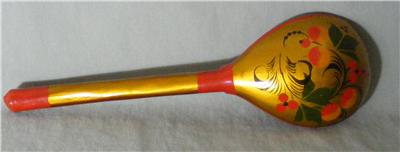Categories: "Food"
Базилик
Also part of my new urban garden is basil, which in Russian is базилик.
| de | das Basilikum |
| es | la albahaca |
| fr | le basilic |
Ложка
The Russian word for spoon is ложка. If someone were using the word spoon in plural terms (spoons), they would say «ложки». When I eat dessert, I say “I need a spoon” «мне нужна ложка» and if I am serving dessert to a group of people, I would say, “I need spoons” «мне нужны ложки». Just like in America, Russia has a different word for teaspoon and tablespoon. The word for teaspoon is чайная ложка which comes from the word чай (meaning tea) while the word for tablespoon is стoловая ложка which comes from the word стол (meaning table).
Traditionally, Russian people use wooden spoons «деревянные ложки» to eat and play music with. Two wooden spoons were held in one hand back-to-back and the player would tap the spoons against each other thus, making a sound. Russian wooden spoons are elaborately painted with bright colors «яркие цвета» and detailed art work. These wooden spoons are truly works of art.

Картошка
Did you know it's the International Year of the Potato?
The formal Russian word for potato is картофель, a masculine first declension noun, which is identical to the German word for the same thing; that suggests that the Russians first learned about potatoes from the Germans. Картофель is a mass noun, which means it can only be used in the singular; you don't use it to say 'two potatoes.' A related word is картофeлина, which means 'a spud' and is a count noun, one that occurs in the singular and the plural, so that is the best way to say 'two potatoes' or 'five potatoes' «две картофелины» «пять картофелин».
But the word that is most often used in Russia to mean potato is картошка, which begins with the stem of the German word and then adds the dimunitive suffix -ошка. It's a count noun, so you can say две картошки two potatoes or пять картошек five potatoes. Although you can use картошка in the plural when specifying the number of potatoes, if you are talking about potatoes generically, you normally use the word in the singular. In other words, in English we say “Do you like potatoes?” (plural), but in Russian we normally say «Ты любишь картошку?» (accusative singular) to get the same idea across. Likewise when you are talking about potatoes by weight, you usually specify it in the singular «Я купил пять кило картошки» (genitive singular) not «Я купил пять кило картошек» (genitive plural). That's true for a lot of food words in Russian: they are used in the singular instead of the plural when discussing them generically.
Russians use potatoes fried, boiled, mashed, stuffed into Russian ravioli and calzones and crepes, and simmered in soups; oddly enough, I don't think I've ever seen a baked potato there. Although you can't imagine Russia nowadays without them, potatoes are not originally a European plant. Russian peasants mostly didn't eat or grow them much before the 18th century when Catherine the Great forced the peasantry to cultivate them. The peasants did not want to do it. They had survived on grains like buckwheat and rye and wheat that grew above ground and could be baked into bread. Who wanted to eat this grotesque misshapen tuber that grew inside the dirt instead of standing nobly above it like proper human food? Some Russian sects actually declared it a sin to eat the potato. In the 19th century Nicholas Ⅰ began to enforce Catherine's order more widely and potato cultivation finally began to spread significantly. The peasants eventually grew to love potatoes, particularly when they saw it took a lot less acreage of potatoes to feed a family as compared to acreage planted with buckwheat. The potatoes were also much more drought and disease resistant, grew more heartily than many plants in the cold Russian climate, and were much less susceptible to wind damage.¹
| de | die Kartoffel |
| es | la papa (the Americas) la patata (Spain) |
| fr | la pomme de terre |
¹ “Indian givers: how the Indians of the Americas transformed the world,” by Jack Weatherford © 1988, pp. 64-66. Also see History Magazine for an interesting article on the history of the potato.
Корица
The Russian word for cinnamon is корица.
What color is cinnamon? It's brown, right? And what is the Russian word for brown? It's коричневый. Wow, what a coincidence.
| de | der Zimt |
| es | la canela |
| fr | la canelle |
Розмарин
As part of my introduction to urban gardening, I decided to grow rosemary, which in Russian is розмарин. I chose this plant because it's tough and drought tolerant, and I wanted one plant that I wouldn't accidentally kill right off the bat.
| de | der Rosmarin |
| es | el romero |
| fr | le romarin |